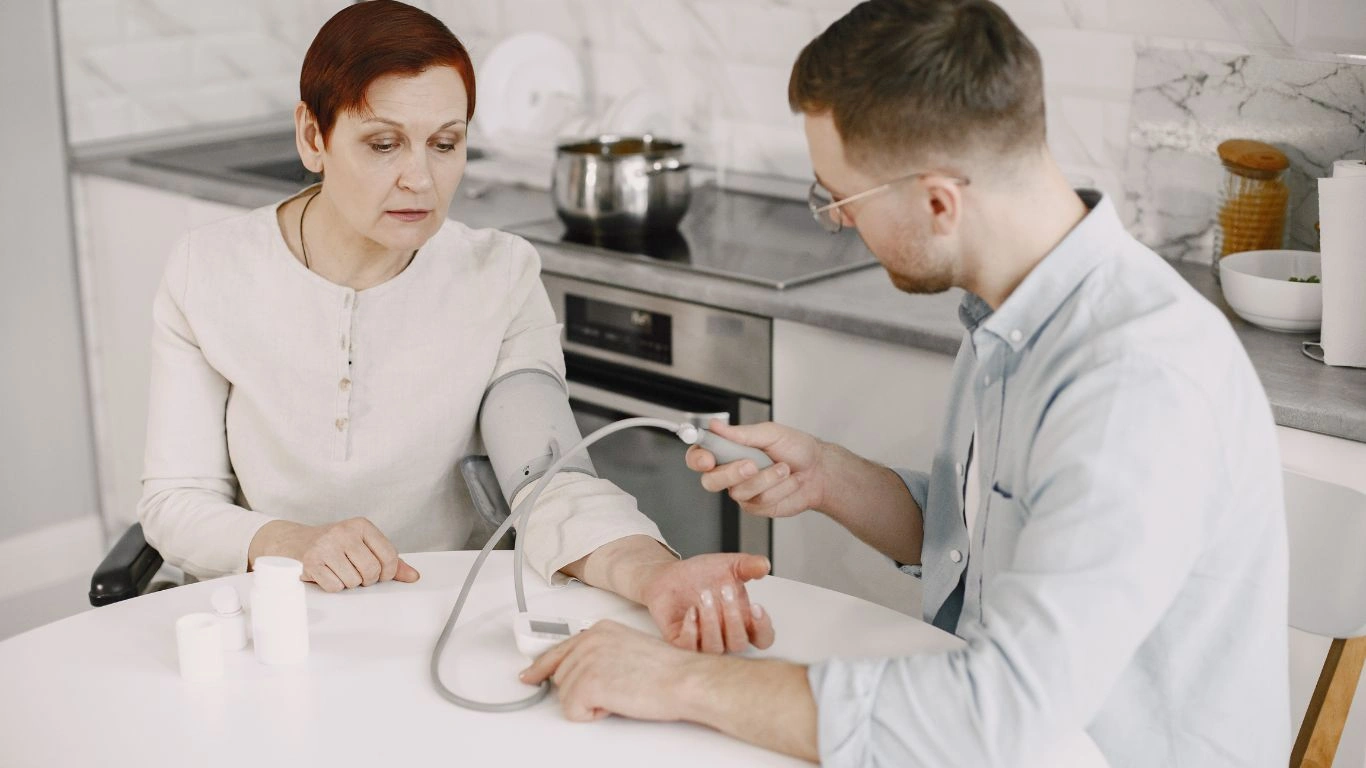Reducing High Blood Pressure with Diet – A Simple Guide to a Healthier Heart
If you’re dealing with high blood pressure, you’re not alone. Many people struggle with this issue, but did you know your diet can play a huge role in helping you manage it? In this guide, we’ll dive into how making simple changes to your meals can help lower your blood pressure naturally.
When it comes to managing high blood pressure (also known as hypertension), lifestyle changes can have a major impact. While medication might be necessary for some, adjusting your diet can often make a significant difference in keeping your numbers in check. So, if you’re wondering how to manage your blood pressure through food, you’re in the right place!

Understanding High Blood Pressure
Before diving into the diet tips, it’s important to understand what high blood pressure is and why it matters. Blood pressure is the force of blood pushing against the walls of your arteries as your heart pumps it around your body. When this pressure is too high, it can damage your arteries and organs over time, leading to serious health issues like heart disease, stroke, and kidney problems. Blood pressure is measured in two numbers: – Systolic pressure (the top number) – This measures the pressure in your arteries when your heart beats. – Diastolic pressure (the bottom number) – This measures the pressure in your arteries when your heart rests between beats. Healthy blood pressure is generally around 120/80 mm Hg. Hypertension is diagnosed when your blood pressure consistently reads above 130/80 mm Hg.

How Diet Can Help Lower Blood Pressure
Your diet can directly impact your blood pressure, and certain foods can help either raise or lower it. To effectively manage high blood pressure, it’s essential to focus on eating foods that are heart-healthy and avoiding ones that could worsen your condition.
1. The DASH Diet: A Proven Strategy
One of the most well-known diets for lowering blood pressure is the DASH (Dietary Approaches to Stop Hypertension) diet. This diet is designed specifically to help lower blood pressure through a focus on nutrient-rich foods like fruits, vegetables, whole grains, lean proteins, and low-fat dairy. Here’s a quick breakdown of its main components: – Fruits and Vegetables: Aim to eat 4-5 servings of each per day. These are rich in potassium, magnesium, and fiber, all of which help manage blood pressure. – Whole Grains: Foods like brown rice, whole wheat bread, and oats are great choices. They provide fiber, which helps improve heart health. – Lean Protein: Skinless poultry, fish, beans, and legumes are excellent sources of protein without the added fat. – Low-fat Dairy: Include low-fat milk, yogurt, and cheese in your diet to get enough calcium, which is crucial for regulating blood pressure. – Nuts and Seeds: Almonds, sunflower seeds, and flaxseeds are great for snacking and are high in heart-healthy fats.
2. Foods That Lower Blood Pressure
Certain foods are especially beneficial for lowering blood pressure. Let’s take a closer look: – Leafy Greens: Spinach, kale, and Swiss chard are packed with potassium, which helps your body balance the amount of sodium in your cells. This is key in keeping your blood pressure in check. – Berries: Blueberries, raspberries, and strawberries are rich in flavonoids, antioxidants that have been shown to help lower blood pressure. – Beets: These root vegetables are high in nitrates, which can help dilate blood vessels and improve blood flow, leading to lower blood pressure. – Oats: Whole grains like oats are a great source of soluble fiber, which can help reduce cholesterol levels and improve heart health. – Fatty Fish: Salmon, mackerel, and sardines are rich in omega-3 fatty acids, which can reduce inflammation and lower blood pressure. – Garlic: Known for its natural ability to relax blood vessels, garlic has long been recognized as a heart-healthy food.
3. Foods to Avoid for Better Blood Pressure
On the flip side, there are foods that can raise your blood pressure and should be limited or avoided altogether: – Salt: Sodium is one of the biggest culprits in raising blood pressure. Try to limit your salt intake by avoiding processed foods and checking food labels for sodium content. Opt for herbs and spices to add flavor instead. – Processed Meats: Bacon, sausage, and deli meats are high in sodium and unhealthy fats. These can contribute to high blood pressure and other heart problems. – Fried and Fast Foods: These tend to be high in unhealthy fats and sodium, making them a poor choice for anyone managing high blood pressure. – Alcohol: While moderate alcohol consumption is okay for some people, excessive drinking can raise blood pressure. Stick to the recommended limits (no more than one drink per day for women and two for men). – Caffeine: While the link between caffeine and blood pressure is still debated, it’s best to limit your intake if you’re concerned about high blood pressure.
Additional Tips for Lowering Blood Pressure Through Diet
Aside from choosing the right foods, there are some additional dietary habits that can help lower your blood pressure: – Stay Hydrated: Drinking plenty of water is essential for maintaining healthy blood pressure levels. Dehydration can lead to higher blood pressure. – Control Portion Sizes: Eating large meals can put a strain on your heart. Try eating smaller, more frequent meals throughout the day. – Increase Potassium Intake: Potassium helps balance the effects of sodium in your body. Include more potassium-rich foods like bananas, oranges, potatoes, and tomatoes. – Reduce Sugar: High sugar intake, particularly from sugary drinks, can contribute to higher blood pressure. Opt for water, herbal teas, or sparkling water instead of sugary sodas.
Conclusion
Managing high blood pressure doesn’t have to be complicated. By focusing on a diet rich in fruits, vegetables, whole grains, lean proteins, and healthy fats, you can help reduce your blood pressure naturally. The DASH diet is a great place to start, but remember, the key is to make sustainable changes that work for your lifestyle. If you’re trying to manage high blood pressure, making mindful food choices can make a huge difference. Pair a healthy diet with regular exercise and stress management, and you’ll be on your way to a healthier heart.
Appendices
References
For further information on reducing high blood pressure with diet, check out these resources:
- National Heart, Lung, and Blood Institute (NHLBI). (2023). DASH Eating Plan. Read Article
- American Heart Association. (2024). High Blood Pressure and Diet. Read Article
- U.S. Department of Agriculture (USDA). (2023). Healthy Eating for Heart Health. Read Article
FAQs
Here are some frequently asked questions about reducing high blood pressure with diet:
- Can reducing sodium lower blood pressure? Yes! Reducing sodium intake can help lower your blood pressure. Aim to consume less than 2,300 mg of sodium per day, and ideally, less than 1,500 mg for optimal heart health.
- What are some quick meals for lowering blood pressure? Try meals like a leafy green salad with grilled chicken, a whole grain wrap with avocado, or a salmon fillet with roasted vegetables. These are all heart-healthy and easy to prepare.
- Can the DASH diet help lower blood pressure quickly? While the DASH diet is effective, it may take a few weeks for noticeable changes. Consistency is key for long-term benefits.
- Is it okay to have occasional treats? Yes, but moderation is important. It’s fine to indulge once in a while, but try to balance it with healthier choices most of the time.
- What should I drink to help lower blood pressure? Water, herbal teas, and beetroot juice are all great choices for lowering blood pressure. Avoid sugary drinks and alcohol in excess.
Disclaimer: This article is for informational purposes only and does not replace professional medical advice. Always consult with a healthcare provider before making any significant changes to your diet, especially if you have high blood pressure or other health concerns.

Dr. Gwenna Aazee is a board-certified Internal Medicine Physician with a special focus on hypertension management, chronic disease prevention, and patient education. With years of experience in both clinical practice and medical writing, she’s passionate about turning evidence-based medicine into accessible, actionable advice. Through her work at Healthusias.com, Dr. Aazee empowers readers to take charge of their health with confidence and clarity. Off the clock, she enjoys deep dives into nutrition research, long walks with her rescue pup, and simplifying medical jargon one article at a time.







